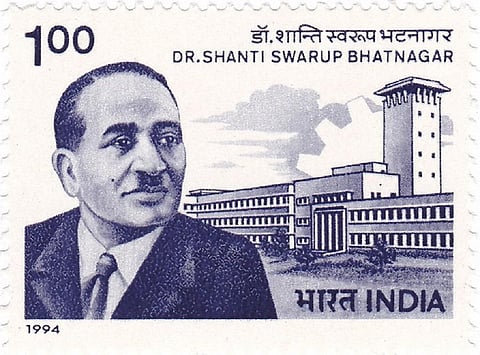

Twelve “male” scientists have been awarded India’s top Shanti Swarup Bhatnagar Prize (SSB) for Science and Technology, 2022.
The announcement was made at the inaugural session of the Council of Scientific & Industrial Research (CSIR) — National Institute of Science Communication and Policy Research’s (NIScPR) One Week One Lab Programme (a theme-based campaign of the CSIR) on September 11, 2023.
The awards were last announced in 2021. The SSB prize is an annual award named after Shanti Swarup Bhatnagar, the founder-director of CSIR.
Since its inception in 1958, only 19 women scientists have been the recipients of the SSB award.
Ashwani Kumar from CSIR-Institute of Microbial Technology, Chandigarh and Maddika Subba Reddy Laboratory of Cell Death and Cell Survival Centre for DNA Fingerprinting Diagnostics, Hyderabad received the award this year in the biological sciences discipline.
Kumar is recognised for his role in understanding biofilm-induced infections involving cellulose.
Biofilms are 3D structures of multiple microorganisms (different bacterial colonies or single types of cells in a group), adhering to the surface.
Recent studies suggested that Mycobacterium tuberculosis forms biofilms that host drug-tolerant bacteria. Kumar’s lab found that cellulose is a key component of these biofilms, holding mycobacterial cells together in these biofilms.
Reddy was awarded for his role in ascribing functions to phosphatases in regulating cellular protein-sorting pathways.
Phosphatases are enzymes that remove a phosphate group from a protein and protein sorting is a mechanism through which proteins are transported to their appropriate destinations in the cell or outside it to carry out their functions.
Two recipients were presented the SSB prize for chemical sciences. Akkattu T Biju from the Indian Institute of Science was recognised for his work on the synthesis of biologically important heterocyclic and carbocyclic compounds.
Heterocyclic compounds and carbocyclic compounds are classes of organic compounds. Heterocycles are used in many biological fields, due to their activity in multiple illnesses.
Debabrata Maiti from the Department of Chemistry, Indian Institute of Technology, Bombay bagged the award for his role in preparing value-added materials by transforming organic molecules. His work could find applications in the agrochemical and pharmaceutical industries.
Vimal Mishra from the Water and Climate Laboratory, Indian Institute of Technology, Gandhinagar won the award for his work in the Earth, Atmosphere, Ocean and Planetary Sciences field. He examined the role of anthropogenic and natural factors on hydrological extremes and water resources in India.
For example, his 2021 study concluded that a roughly 11 per cent decline in the summer monsoon (June–September) during 1951-2016, severe and frequent droughts (2009, 2014, 2015), and groundwater pumping for irrigation have contributed to groundwater depletion in the Ganga basin.
Under the engineering science division, Dipti Ranjan Sahoo from the Department of Civil Engineering, Indian Institute of Technology, Delhi received an award for his work in the area of seismic design and mitigation of seismic effects on buildings and bridges.
Rajnish Kumar, Department of Chemical Engineering, Indian Institute of Technology, Madras also won the SSB award for engineering sciences. He was recognised for his contribution to the fundamental understanding of methane recovery from marine gas hydrates, among others.
Marine gas hydrates are ice-like substances known to house huge reserves of methane gas and are being considered as an energy resource. They naturally occur on the seafloor and in subsurface sediments in water depths of 300 metres and beyond.
Apoorva Khare from the Indian Institute of Science and Neeraj Kayal from Microsoft Research Lab India were awarded the SSB prize for Mathematics.
For medical sciences, Dipyaman Ganguli, CSIR-Indian Institute of Chemical Biology was awarded for his work on autoimmunity and metaflammation.
Autoimmunity occurs when the immune system attacks the body’s own cells and tissues. Metaimflammation is chronic low-grade inflammation associated with obesity induced by alterations in metabolism.
In the physical sciences discipline, Anindya Das from the Indian Institute of Science and Basudeb Dasgupta from the Tata Institute of Fundamental Research got the prize.
Das has contributed to the understanding of electric and thermoelectrical properties of strongly interacting 2-D atomically thin materials.
Atomically thin materials with thicknesses in the atomic scale (typically less than 5 nanometres) can be used in rechargeable metal-ion batteries, metal-sulphur batteries and metal-air batteries.
Dasgupta received the award for his research on coherent interactions of neutrinos (they have no charge but some mass) in dense astrophysical environments and the nature of dark matter.